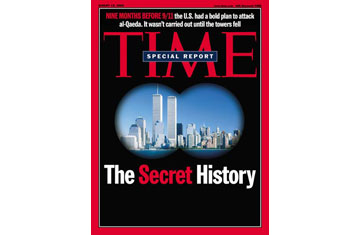
(17 of 19)
Whatever Moussaoui's true tale may be, the Minnesota field office was convinced he was worth checking out. Agents spent much of the next two weeks in an increasingly frantic--and ultimately fruitless--effort to persuade FBI headquarters to authorize a national-security warrant to search Moussaoui's computer. From Washington, requests were sent to authorities in Paris for background details on the suspect. Like most things having to do with Moussaoui, the contents of the dossier sent over from Paris are in dispute. One senior French law-enforcement source told TIME the Americans were given "everything they needed" to understand that Moussaoui was associated with Islamic terrorist groups. "Even a neophyte," says this source, "working in some remote corner of Florida, would have understood the threat based on what was sent." But several officials in FBI headquarters say that before Sept. 11 the French sent only a three-page document, which portrayed Moussaoui as a radical but was too sketchy to justify a search warrant for his computer.
The precise wording of the French letter isn't the issue. The extraordinary thing about Moussaoui's case--like the Phoenix memo--is that it was never brought to the attention of top officials in Washington who were, almost literally, sleepless with worry about an imminent terrorist attack. Nobody in the FBI or CIA ever informed anybody in the White House of Moussaoui's detention. That was unforgivable. "Do you think," says a White House antiterrorism official, "that if Dick Clarke had known the FBI had in custody a foreigner who was learning to fly a plane in midair, he wouldn't have done something?"
In blissless ignorance, Clarke and Tenet waited for the meeting of the Principals. But the odd little ways of Washington had one more trick to play. Heeding the pleas from the FBI's New York City office, where Mawn and O'Neill were desperate for new linguists and analysts, acting FBI director Pickard asked the Justice Department for some $50 million for the bureau's counterterrorism program. He was turned down. In August, a bureau source says, he appealed to Attorney General Ashcroft. The reply was a flat no.
Pickard got Ashcroft's letter on Sept. 10. A few days before, O'Neill had started a new job. He was burned out, and he knew it. Over the summer, he had come to realize that he had made too many enemies ever to succeed Mawn. O'Neill handed in his papers, left the FBI and began a new life as head of security at the World Trade Center.
THE TWO VISITORS
As the first cool nights of fall settled on northeast Afghanistan, Ahmed Shah Massoud was barely hanging on. His summer offensive had been a bust. An attempt to capture the city of Taloqan, which he had lost to the Taliban in 2000, ended in failure. But old allies, like the brutal Uzbek warlord Abdul Rashid Dostum, had returned to the field, and Massoud still thought the unpopularity of the Taliban might yet make them vulnerable. "He was telling us not to worry, that we'd soon capture Kabul," says Shah Pacha, an infantry commander in the Northern Alliance.
